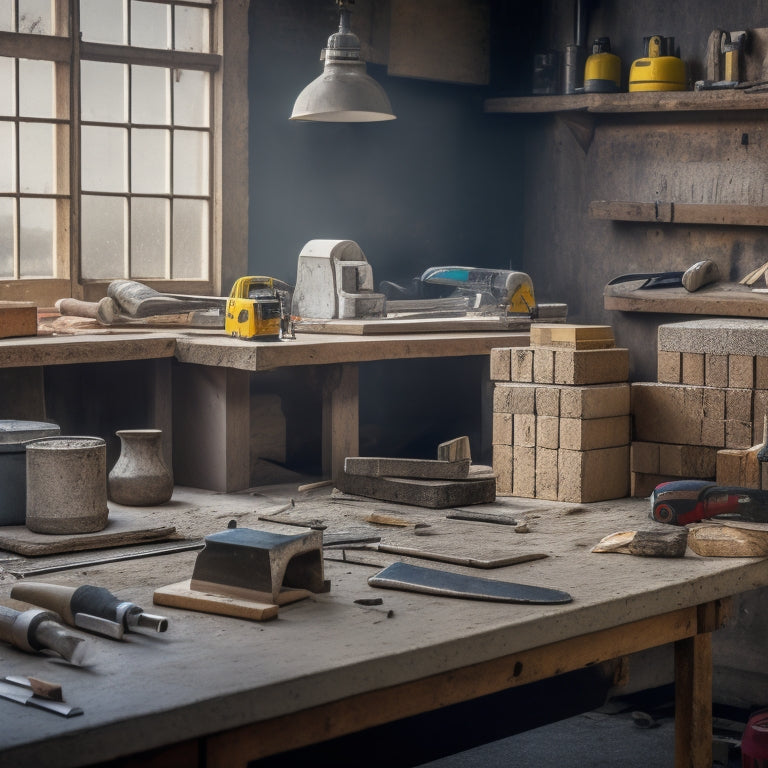
Top Picks for Concrete Block Planing Tools
Share
When selecting a concrete block planing tool, you'll want to take into account factors like power, comfort, and precision. Electric cinder block planers offer efficiency and speed, while gas-powered models provide extra power for large-scale projects. Cordless options offer mobility, and planer attachments for angle grinders provide a cost-effective solution. If you're new to block planing, look for user-friendly designs with adjustable handles and ergonomic grips. Whichever type you choose, make certain to prioritize safety and maintenance to guarantee peak performance. Now, discover the top brands and models that'll take your project to the next level.
Key Takeaways
• Consider electric, gas-powered, or cordless block planers based on project size, power needs, and user comfort.
• Look for adjustable handles, ergonomic grips, and easy-to-read gauges for user-friendly operation and reduced fatigue.
• Top brands like Bosch, DeWalt, Makita, Hitachi, and Hilti offer high-quality block planers with durable construction and reliable performance.
• Prioritize safety features, such as automatic feed systems, dust collection, and safety gear, to prevent accidents and ensure optimal performance.
• Evaluate power ratings, weight, and portability when selecting a block planer, and consider warranty options for long-term investment protection.
Best Block Planers for Beginners
Choose a block planer that's easy to handle and maintain, as it will make your learning curve less steep and help you achieve professional-looking results faster.
As a beginner, you don't want to struggle with a planer that's heavy, cumbersome, or difficult to adjust. Instead, focus on finding a planer that's designed with user-friendliness in mind.
When choosing planers, look for features like adjustable handles, ergonomic grips, and easy-to-read gauges. These features will help you master basic planer techniques quickly and efficiently.
A well-designed planer will also reduce fatigue and strain, allowing you to work for longer periods without getting tired. Remember, the goal is to achieve smooth, even surfaces, not to wrestle with your equipment.
Top Electric Cinder Block Planers
You'll find that electric cinder block planers are a game-changer for beginners, offering more power and efficiency than their manual counterparts, and making it possible to tackle larger projects with ease.
With an electric block planer, you'll be able to plane concrete blocks quickly and accurately, saving you time and effort.
When choosing an electric cinder block planer, consider the features that matter most to you. Look for a planer with a high-powered motor, adjustable depth control, and a durable construction that can withstand heavy use.
In your search, you'll come across various electric block planer reviews that highlight the benefits of different models. Pay attention to the cinder block planer features that are most important to you, such as speed, precision, and ease of use.
Top-rated electric block planers often boast advanced features like automatic feed systems and dust collection, making the planing process smoother and more efficient.
Gas-Powered Planer Options Reviewed
With gas-powered planers, you're getting into heavy-duty territory, ideal for large-scale projects or frequent use, where their increased power and portability come into play. Gas-powered planers offer more muscle than their electric counterparts, making them perfect for demanding jobs. One of the significant gas planer advantages is their ability to tackle tough concrete blocks with ease.
Here are some top gas-powered planer options to contemplate:
| Model | Power (cc) | Fuel Efficiency (g/kWh) |
|---|---|---|
| Husqvarna K 970 | 94 | 450 |
| Makita EK7301 | 73 | 420 |
| DeWalt DXT | 87 | 480 |
| Hitachi CM75EB | 75 | 400 |
| STIHL GS 461 | 91 | 440 |
When choosing a gas-powered planer, reflect on the power output, fuel efficiency, and weight. Look for models with high power output and excellent fuel efficiency to guarantee you get the most out of your planer. Additionally, reflect on the weight and ergonomics of the planer, as it will impact your comfort and productivity during extended use.
Planer Attachment for Angle Grinders
If you already own an angle grinder, consider adding a planer attachment to expand its capabilities and tackle concrete block planing tasks efficiently. This clever accessory can transform your trusty grinder into a powerful planer, perfect for smoothing out rough concrete surfaces.
When selecting an angle grinder for planing, look for a model with high torque and RPM to guarantee effective concrete removal.
The planer attachment benefits are numerous. For one, it saves you the cost of buying a separate planer. Additionally, it's a space-saving solution, as you're utilizing a tool you already own.
The attachment is also relatively lightweight, making it easy to maneuver and reducing fatigue. Furthermore, it's often more affordable than a dedicated planer, making it an attractive option for professionals and DIYers alike.
Cordless Block Planer for Portability
When working on concrete block planing projects that demand greater mobility, a cordless block planer becomes an ideal solution, offering the freedom to move around the job site without the constraint of cords. You'll appreciate the flexibility to tackle tasks in tight spaces or on large projects that require frequent repositioning. Cordless block planers are designed with portability in mind, featuring compact designs that make them easy to handle and maneuver.
Here are some key considerations when selecting a cordless block planer:
| Model | Battery Life | Weight |
|---|---|---|
| DeWalt DCPBP | Up to 45 minutes | 11.5 lbs |
| Makita XBP02 | Up to 30 minutes | 10.3 lbs |
| Bosch GOP18V | Up to 20 minutes | 9.3 lbs |
| Hitachi DV18DL | Up to 35 minutes | 12.1 lbs |
When choosing a cordless block planer, prioritize battery life, as it directly impacts your productivity. Look for models with high-capacity batteries that can handle extended use. Additionally, consider the weight and ergonomics of the tool, as these factors will affect your comfort and control during prolonged use. With the right cordless block planer, you'll be able to tackle concrete block planing projects with ease and efficiency.
Block Planer Safety Essentials Checklist
Before operating a block planer, you must guarantee a safe working environment by following a thorough safety essentials checklist to minimize the risk of accidents and injuries.
This checklist should include wearing essential safety gear such as safety glasses, ear protection, dust masks, and gloves to protect yourself from flying debris and hazardous materials.
Next, review and understand the operating procedures outlined in the manufacturer's instructions to verify you're familiar with the block planer's capabilities and limitations.
Make sure you're aware of the recommended cutting depths, feed rates, and pressure to apply to avoid kickbacks and loss of control.
Additionally, inspect the block planer regularly to confirm it's in good working condition, and perform routine maintenance tasks as recommended.
Top Brands for Concrete Block Planers
You'll find a range of top brands offering high-quality concrete block planers that cater to different needs and budgets, from industry giants to innovative newcomers.
When choosing the right brand for your concrete block planing needs, it's crucial to take into account factors such as performance, durability, and user reviews. Here are some top brands to keep in mind:
-
Bosch: Known for their high-torque motors and durable construction, Bosch planers are a popular choice among professionals.
-
DeWalt: DeWalt planers are praised for their ease of use and versatility, making them suitable for both beginners and experienced users.
-
Makita: Makita planers are renowned for their high-quality blades and robust design, ensuring efficient and precise planing.
-
Hitachi: Hitachi planers offer a perfect balance of power and precision, making them ideal for various concrete block planing tasks.
-
Hilti: Hilti planers are designed for heavy-duty use, offering exceptional performance and durability in demanding applications.
When conducting brand comparisons, pay attention to user reviews and ratings to get a sense of each brand's strengths and weaknesses.
Planer Maintenance and Storage Tips
Properly maintaining and storing your concrete block planer is essential to extending its lifespan, preventing damage, and ensuring ideal performance on the job site. You can't afford to neglect your planer's maintenance, as it'll lead to subpar results and increased downtime.
Start by performing regular planer blade maintenance. Inspect your blades daily for signs of wear and tear, and replace them as needed. Clean your planer thoroughly after each use to prevent debris buildup.
When storing your planer, make sure it's in a dry, secure location, away from direct sunlight and moisture. Invest in tool storage solutions like cases or bags to protect your planer during transport.
Additionally, keep your planer's manual and accessories organized and easily accessible. By following these simple maintenance and storage tips, you'll be able to maximize your planer's performance, reduce repair costs, and get the job done efficiently.
Frequently Asked Questions
Can I Use a Block Planer on Old or Damaged Concrete Blocks?
You're wondering if you can use a block planer on old or damaged concrete blocks. The answer depends on the block condition.
If the blocks are crumbling or severely damaged, it's not recommended to use a block planer. Instead, focus on surface preparation by cleaning and patching any cracks or holes.
Once the surface is stable, you can use a block planer to smooth out the blocks. However, if the damage is extensive, it's better to replace the blocks altogether to guarantee a solid foundation.
How Do I Prevent Dust Inhalation When Using a Block Planer?
Remember the phrase 'dust thou shalt not inhale'?
When using a block planer, it's vital to prioritize dust control methods. You're already aware of the importance of a clean surface, but don't forget about respiratory protection.
Wear a dust mask or respirator to prevent inhaling harmful particles. You can also use a vacuum attachment or a dustless cutting system to minimize airborne dust.
Stay safe and breathe easy!
Are There Any Specific Planer Bits for Different Concrete Types?
When working with different concrete types, you'll want to choose planer bits that match the job.
You'll find bits designed for specific concrete strengths, densities, and aggregates.
Confirm planer compatibility by checking the bit's specifications against your concrete type.
Using the wrong bit can lead to reduced tool life or even damage.
You won't compromise on power, so don't compromise on the right bit for the job - it's vital for peak performance and results.
Can I Rent a Block Planer Instead of Buying One?
You're wondering if renting a block planer is a better option than buying one. That's a smart move!
Renting can be a cost-effective solution, especially for one-time or infrequent projects. Compare the rental cost to the purchase price and consider the frequency of use.
If you won't need it often, renting might be the way to go. Research local equipment rental shops to find the best block planer rental options and get the job done without breaking the bank.
Do I Need a Vacuum Attachment for My Block Planer?
As you immerse yourself in the world of block planing, a storm of dust and debris awaits, threatening to engulf your workspace.
But fear not, for a vacuum attachment can be your trusted shield. You'll want to contemplate this feature when selecting your block planer, as it'll help contain the chaos and leave your site spotless.
With a vacuum attachment, you'll reap benefits like improved air quality, reduced cleanup, and enhanced precision.
Conclusion
You've got the scoop on the top concrete block planing tools! Now, get ready to tackle your next project.
Did you know that the global concrete block market is projected to reach $3.4 billion by 2025? With the right tools, you can tap into this growing industry.
Remember to prioritize safety, maintenance, and storage to guarantee your planer stays in top shape.
With the right tools and know-how, the possibilities are endless!
Related Posts
-

Top Tools for Mixing Concrete at Home
When mixing concrete at home, you'll need a range of tools to guarantee a successful operation. Start with essential ...
-

Essential Tools for Epoxy Concrete Floor Repair
You'll need a thorough arsenal of specialized tools to guarantee a successful epoxy concrete floor repair. Floor prep...
-

Must-Have Tools for Concrete Planter Projects
As you commence your concrete planter project, you'll need a range of specialized tools to achieve professional-grade...


